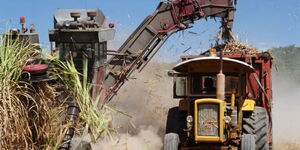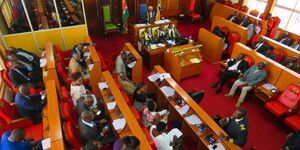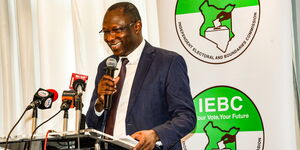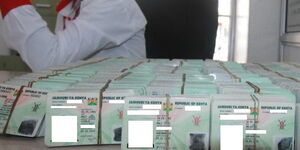Prime Cabinet Secretary Musalia Mudavadi has acknowledged that Kenya will take a longer time to recover from the impact of policy shifts introduced by US President Donald Trump's administration — including the 10 per cent reciprocal tariff imposed last Wednesday.
Speaking during the Inaugural Africa Exchange Meeting in Nairobi on Monday, April 7, Mudavadi maintained that the government of Kenya had to move with speed to address the sectors impacted by Trump's policies.
According to the Foreign Affairs Cabinet Secretary, Kenyans — and Africans at large — must brace for a prolonged period of adjustment, noting that reversing the impact of recent US policy shifts, including cuts to the United States Agency for International Development (USAID), could take years.
''On what is happening in the US today, we must brace ourselves for a long ride. The measures that the administration in the US is putting in place will become very difficult to undo. Once they are done, it will take a very long time to undo," Mudavadi stated.
''It will take a couple of decades or more for some of those policy decisions to reverse. So, we need to start preparing ourselves in the context of these developments.''
Furthermore, Mudavadi urged the government to start thinking of how to effectively fund key sectors that depended on grants and aid from the US.
Mudavadi emphasised the need to prioritise critical sectors such as health and education, which are likely to feel the ripple effects of changing US policy.
His remarks follow a significant blow to Kenya-US trade relations after Trump signed an executive order last Wednesday imposing a 10 per cent reciprocal tariff on all Kenyan exports to the US.
The new tariff threatens Kenya’s Ksh109.7 billion (USD 784 million) trade with the US, targeting key sectors like textiles, tea, and coffee—which were previously protected under the African Growth and Opportunity Act (AGOA).
The policy shift is expected to result in reduced exports, potential job losses, and declining revenues for local businesses that depend heavily on access to the US market.
The order, equally affecting other countries, came less than two months after Trump directed his government to impose fresh tariffs on countries that charge value-added tax (VAT) on US products.
On Saturday, the Kenya Association of Manufacturers (KAM) urged Trump to reconsider the 10 per cent tariff imposed on Kenyan exports.
KAM Chief Executive Tobias Alando warned that the levy would significantly hurt Kenya’s price competitiveness in the US market, putting exporters at a disadvantage and threatening trade gains made under previous agreements.












